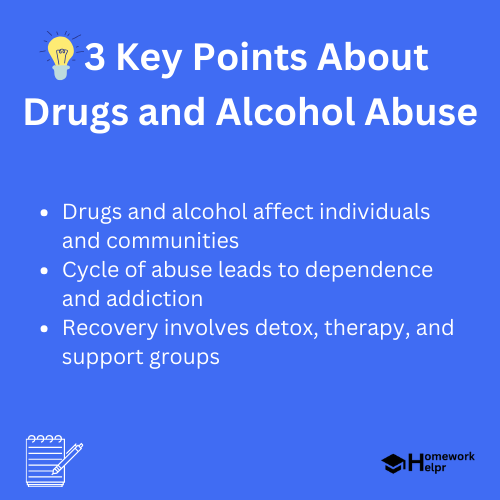📝 Summary
Drugs and alcohol abuse are critical global issues impacting individuals and their communities. Both substances can significantly alter behavior and mental state, leading to a range of problems. Drugs vary from legal medications to illegal substances like heroin. Alcohol, when abused, can result in serious health risks and dependence. The cycle of abuse includes experimentation, regular use, dependence, and ultimately addiction. Consequences of substance abuse include health issues, strained relationships, and legal problems. Prevention through education and awareness is key, along with support systems for recovery, such as detoxification and therapy. Understanding these challenges is vital for effective prevention and recovery.
Understanding Drugs and Alcohol Abuse
Drugs and alcohol abuse are significant issues that affect individuals and communities worldwide. These substances can alter a person’s behavior, mood, and mental state, leading to a range of problems that affect not only the user but also their loved ones and society as a whole. Understanding the impact of these substances is essential for prevention and recovery.
What Are Drugs and Alcohol?
Drugs are substances that can change how our bodies and minds function. They can be legal, such as prescription medications, or illegal, such as heroin or cocaine. On the other hand, alcohol is a legal substance that, when consumed excessively, can lead to serious health risks and dependence.
There are various classifications of drugs including:
- Stimulants – These increase energy and alertness (e.g., caffeine, cocaine).
- Depressants – These slow down the body’s functions (e.g., alcohol, benzodiazepines).
- Hallucinogens – These alter perception (e.g., LSD, psilocybin mushrooms).
Definition
Dependence: A condition in which a person needs to use a substance to function normally.
Example
For example, someone who uses caffeine regularly may experience headaches and fatigue without it, indicating a dependence on the drug.
The Cycle of Abuse
Understanding the cycle of abuse is important to help break it. Many individuals turn to drugs and alcohol for various reasons, such as stress, peer pressure, or to escape from reality. However, what often starts as casual use can quickly lead to abuse.
The cycle often includes the following stages:
- Experimentation: Trying drugs or alcohol for the first time.
- Regular Use: Establishing a routine with the substance.
- Risky Behavior: Engaging in dangerous activities while under the influence.
- Dependence: Developing a need for the substance, leading to withdrawal symptoms when not used.
- Addiction: Loss of control over use, continuing despite harmful consequences.
Definition
Withdrawal Symptoms: Physical and mental effects that occur when reducing or stopping the use of a substance.
Example
For instance, someone who suddenly stops drinking alcohol may experience tremors, anxiety, and nausea, which are withdrawal symptoms.
The Consequences of Abuse
The abuse of drugs and alcohol can lead to a plethora of negative consequences, affecting health, relationships, and even legal standings. The ramifications extend beyond just the individual user.
Some of the consequences include:
- Health Issues: Chronic diseases, mental health disorders, and infections (particularly with injectable drugs).
- Social Problems: Strained relationships, isolation, or troubles in school and work.
- Legal Problems: Arrests or legal issues due to possession or driving under the influence.
💡Did You Know?
Did you know? The National Institute on Drug Abuse estimates that drug addiction costs the U.S. economy over $740 billion each year due to crime, lost work productivity, and health care.
Prevention and Awareness
Recognizing the signs of drugs and alcohol abuse not only helps individuals but also communities to become more informed. Primary prevention involves educating young people about the dangers of substance abuse before they even start using. Those at risk can be reached through various methods:
- School Programs: Workshops and discussions on the risks of drug and alcohol use.
- Community Initiatives: Local organizations that support youth development without drugs.
- Family Support: Encouraging open conversations about substance use and its effects.
Definition
Awareness: Knowledge or perception of a situation or fact, leading to an understanding of the need for action.
Example
For instance, a school could implement a peer-led program that discusses personal stories of overcoming addiction, thereby raising awareness and promoting healthy choices.
Recovery from Substance Abuse
Recovery is a vital part of overcoming drug and alcohol dependence. Many individuals struggle with the addiction cycle for years but seek help at some stage in their lives. Recovery involves a series of steps including:
- Detoxification: Safely removing the substance from the body under medical supervision.
- Therapy: Counseling to address the psychological aspects of addiction.
- Support Groups: Joining groups like Alcoholics Anonymous (AA) for community and support.
Definition
Detoxification: The process of removing toxic substances from the body, often requiring medical assistance.
Example
For example, someone may attend group therapy sessions multiple times a week to share experiences and find encouragement from others who are also in recovery.
Conclusion
Drugs and alcohol abuse are serious issues that can have lasting effects on individuals and society. Understanding the nature of these substances, the cycle of abuse, consequences, and the importance of prevention and recovery are crucial in the fight against addiction. If you or someone you know is struggling with substance abuse, it is important to seek help. Remember, recovery is a journey, but it is one that can lead to a healthier and more fulfilling life.

Related Questions on Drugs and Alcohol Abuse
What are the signs of drugs and alcohol abuse?
Answer: Signs may include changes in behavior, withdrawal from social events, neglecting responsibilities, and physical health issues.
What steps can be taken for prevention?
Answer: Education, school programs, family support, and community initiatives can effectively prevent substance abuse.
What is the recovery process for addiction?
Answer: Recovery typically involves detoxification, therapy, and participation in support groups.
How can someone seek help for substance abuse?
Answer: Individuals can reach out to mental health professionals, support groups, or hotlines dedicated to substance abuse recovery.
